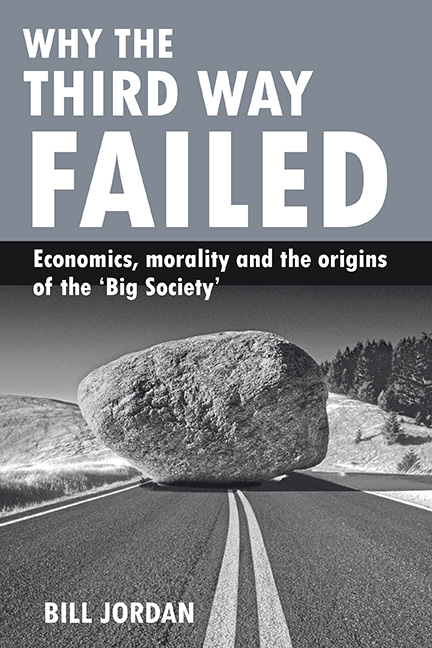four - What is economics good for?
Published online by Cambridge University Press: 01 September 2022
Summary
The Third Way defined itself in terms of ‘the conviction that a growing market economy can be reconciled with a good society’; it proclaimed that it was ‘at ease with the primacy of the market’, but insisted that ‘the ethical foundations of socialism – fraternity and equality – can coexist with the freedoms of liberalised markets and liberal democracy’ (Latham, 2001, pp 25-6). The most influential economist in the post- Washington Consensus, the former chief economic adviser to the World Bank, Joseph Stiglitz, described the new agenda for global economic development as one in which government and markets were complementary:
… [in] some circumstances the new agenda sees government as helping to create markets…. In other areas (such as education), it sees the government and the private sector working together as partners, each with its own responsibilities. And in still others (such as banking), it sees government as providing the essential regulation without which markets cannot function. (Stiglitz, 2001, p 347)
In many ways, the new economic orthodoxy of the later 1990s, which was adopted as its model for public policy by the Third Way, seemed to accept the moral and political principles outlined in Chapter One of this book. For instance, it recognised that institutions were all-important in understanding how markets actually distributed resources and incomes, and hence produced the outcomes on which judgements about equity between citizens could be made. Taken in combination with the Third Way's claimed commitment to ‘a new social contract between the winners and losers from globalisation’ (Latham, 2001, p 28), this new institutional approach could provide the basis for social justice.
However, the range of institutions seen as significant by the new economics – property, markets, contracts, law and government – was far narrower than those reviewed in the analysis of justice in Chapter One. The new economics would have little to say about any of the examples given in that chapter, concerning social relations in legislatures, school playgrounds or even fairness between traders in stock markets.
But even worse, the new approach actually attempted to extend the scope of orthodox micro-economic analysis to spheres from which it previously excluded itself. It sought to explain social behaviour in units such as families, associations, communities and polities in terms of ‘information imperfections’ (Woolcloth, 1998; Dasgupta, 2000), ‘externalities’ (Collier, 1998; Foley and Edwards, 1999) or ‘extended utility functions’ (Becker, 1996).
- Type
- Chapter
- Information
- Why the Third Way FailedEconomics, Morality and the Origins of the 'Big Society', pp. 87 - 108Publisher: Bristol University PressPrint publication year: 2010



